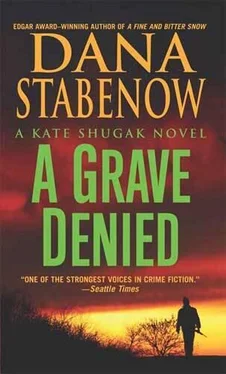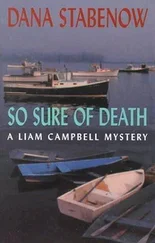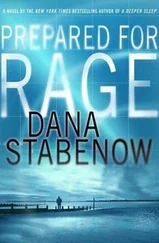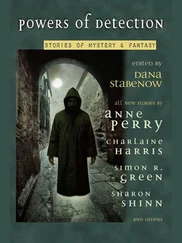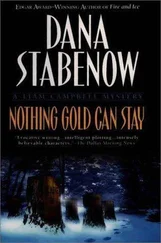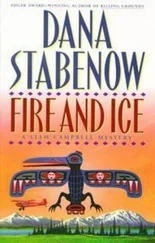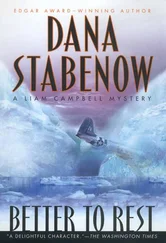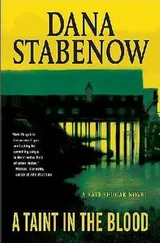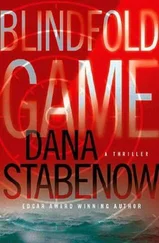“Dinner,” Dinah said, bringing in a platterful of steaks from the porch, “is served.”
“I got to thinking after you left,” Bobby said, handing Kate a plate to dry. The dinner dishes had been cleared away, and Dinah was readying Katya for bed. “I think maybe Dreyer was in ‘Nam.”
“Yeah?” She put the plate away and got handed a bowl.
“I was working in the yard the day he was working on the roof, and I had the portable CD player on the porch with CCR on. ”Run Through the Jungle‘ was playing, and he sang along to it. Hell, we both did. When it was over he looked down at me and said, “Lord it was a nightmare,” and I said ’The devil was on the loose,“ and he said, ”Got that right,“ and I went back to my bonfire and he went back to stapling shingles.”
“That’s all?”
“If you were there, that’s enough.” He pulled the plug and let the water gurgle down the drain.
Kate thought about it as she hung the dish towel on the handle of the refrigerator. The only other personal information on Dreyer she had discovered was that he’d liked a song by another band, who was it… Poison, that was it. It rang a bell with her but she couldn’t place it. She’d have to look through her tapes when she got back to the cabin.
“Kate?”
She looked around to see Bobby jerk his head toward the porch. Dinah was billing and cooing to Katya and didn’t notice them leave, or pretended not to.
Kate perched on the porch railing and inhaled spring air. It had been another sunny day, temperatures in the mid to upper fifties. That was one thing she liked about living in interior Alaska, it warmed up faster and got hotter than the coastal communities. “What?” she said.
Bobby rolled the tires on his chair back and forth some. He radiated an aura of deep discomfort. Kate wondered what was coming. Was Dinah pregnant again? If so, why the long face? Was he finally, at long last, low on cash? She did a mental calculation, figuring out how much she could spare from what she needed to keep in reserve to wage a custody fight.
“It’s about my brother,” he said, the words bursting out of him like champagne following a cork, only not quite as effervescent.
Kate stared at him, mouth slightly open.
“What?” he said defensively.
She got her jaw back up and her voice working again. “You have a brother?”
He scowled. “Why does everyone keep saying that? Yes. I have a brother. And he’s coming to town. Tomorrow.”
“Oh.” For the life of her, Kate couldn’t think of what next to say.
Bobby stewed for a moment. “Name’s Jeffrey. Not Jeff, not Jeffie, Jeffrey.”
“Okay.”
“Jeffrey Washington Clark. Washington was my mama’s family name. It’s my middle name, too.”
“Okay,” Kate repeated. “So,” she said, venturing out cautiously, “great, your brother’s coming. Be the first time he’s visited the Park, right?” Oh no, she thought, realizing suddenly what was in the wind. He wanted her to give his brother the dollar and a quarter tour. She remembered what had happened the last time she’d toured a friend’s relatives around the Park, and shuddered.
“When’s the last time you saw a black man in the Park besides me?” he snapped.
Never.
“So yeah, it’s his first trip in.” He fixed her with a piercing gaze. “This won’t be pleasure, Kate. It’ll be business. Family, yes, but business. He wants something.”
“What?”
“I don’t know. He didn’t say.”
Kate looked over his head to see Dinah standing on the other side of the screen door. She raised an eyebrow. Dinah shrugged her shoulders and shook her head. Kate looked back at Bobby. “So your brother’s coming and it won’t be fun. Sounds like your ordinary, run of the mill Park family to me.”
He gave a short bark of laughter. “I wanted to warn you,” he said, and she thought she saw an unusual trace of color beneath his skin. Robert Washington Clark might just be embarrassed, for probably the first time since Kate had known him.
She might have paused to savor the moment had he not been so obviously uncomfortable. “Warn me about what?”
He shifted in his chair. “He’s a bigot, Kate. A bad one. He’s my father all over again. He doesn’t know where I live, who I live among, who my friends are, or-”
“Or, perhaps, to whom you are married?” Kate said delicately.
Bobby cast an involuntary look over his shoulder, but Dinah had moved away from the door. “That, too. I didn’t even know he knew where I was. I don’t know how the hell he found me. God knows I’ve had no truck with those people since I joined the army.”
Kate detected some Tennessee in Bobby’s speech, which only appeared in times of acute stress. “What do you need me to do?” He looked up and she gave a faint smile. “Anything, Bobby. You want me to run him out of town the minute he gets here? I’ll meet his plane.”
He laughed again, but this time it was genuine. “What I wouldn’t give to see that, old Jeffie hustled back into a plane by an unblack female half his size.” He sighed. “Much as I’d like that, no.”
“Then what?”
“I’ve got him over at Auntie Vi’s. I don’t want him here. The man has no manners.”
Kate understood. Bobby had a lot of good will going on in the Park. He was afraid his brother was going to step all over that, and he wanted her to make sure it didn’t happen. “No problem,” she said, sliding to her feet.
He looked at her, worried. “Sure?”
“I’m sure,” she said, and looked at him affectionately. There wasn’t much she wouldn’t do for Bobby Clark.
“No,” he said, “I meant are you sure you can keep it together when he starts insulting the slant of your eyes and the color of your skin.”
She laughed. “Oh Bobby,” she said, still laughing as she went down the steps, Mutt at her side. “If a whole country full of white folks hasn’t managed to irretrievably piss me off, one lone black man isn’t going to, either. I’ll spread the word.”
“Thanks, Kate,” he said, raising his voice as she climbed into her truck. “I owe you one.”
“Don’t kid yourself, Clark, you owe me all!” she yelled out the window, and headed down the road.
The Hagbergs’ homestead was one of the oldest in the Park, though the Hagbergs themselves were relatively new to it, having moved there only in the late ‘70s. It was the old Barker place, Kate remembered as she drove down the narrow track from the road. The Barkers had originally come north in the gold rush, taking the route up and over from Valdez via mule train, and by the time they got to what would become the Park they’d gotten tired. Mrs. Barker, according to legend, had tied up her skirts to show a prettily turned ankle and served pancakes hot off a griddle she’d hauled to Alaska from San Francisco. Mr. Barker played the squeeze box and sang sea chanties. By the time the rush had dwindled to a trickle, they’d amassed a sum large enough to homestead. They’d been good pioneers, so it was said, until Mrs. Barker decided seven children were enough and ran off to Fairbanks, where it was said she and her ankles prospered on the Line. Mr. Barker held down the home fort, raised the kids, and on his deathbed enjoined his daughters to be true to their husbands and his sons never to trust a woman. Two of the sons joined Castner’s Cutthroats and both died on Attu in World War II. The third son stayed home to marry off his sisters. This wasn’t difficult, as women were in even shorter supply in Alaska during the war than they were in normal times. The third son, name of Ezra, stayed single and made a living trapping beaver and wolf. He’d died suddenly of pancreatic cancer in 1976, and his sister, Telma, who had married a Norwegian fisherman from Valdez, moved in that same summer with her husband, Virgil.
Читать дальше
